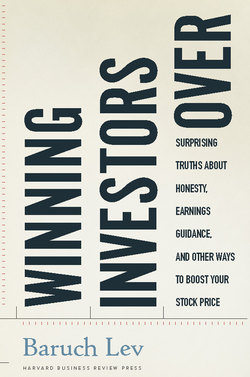Читать книгу Winning Investors Over - Baruch Lev - Страница 5
На сайте Литреса книга снята с продажи.
What, Me Worry?
ОглавлениеSome managers profess to be largely unconcerned with investors, claiming that shareholders are just one class of stakeholders managers should answer to, and perhaps not even the most important class. Furthermore, say managers, most investors are short-term oriented, and catering to their whims interferes with advancing the long-term growth of companies. Others claim they don’t plan to issue stock in the foreseeable future, so why bother about stock prices? And then there are the ideologues arguing that Wall Street should be kept separate from Main Street: managers should do their thing—run the business—and investors will follow. Such “isolationist” views reflect a fundamental misconception of capital markets and are hazardous to companies and their managers’ careers.
This is why: the premises underlying the isolationists’ arguments are factually flawed. Take investors’ myopia. As I demonstrate later, while some investors are indeed short-term oriented, the market as a whole is clearly dominated by long-term investors, as evidenced by my finding that about half of the typical stock price reflects the long-term growth prospects of companies. Or, consider the attitude of “we don’t plan to issue stock in the foreseeable future, hence…”—an unwise posture, to put it mildly. One never knows when an attractive investment opportunity—a business acquisition or a major R&D project—will present itself, but if the company’s shares at the moment are seriously undervalued, managers will be deprived of a ready source of financing. And when credit markets dry up, as was the case from 2008 to 2009, where will investment funding come from? Here, as elsewhere in the book, empirical evidence speaks loudly. As prominent finance scholars Gene Fama and Ken French document in a 2004 study, the likelihood of any firm tapping into the stock market is high: from 1993 through 2002, 86 percent of their sample (3,000 to 4,500 U.S. companies) issued some equity—seasoned equity offerings, equity issues in mergers, private placements, or employee stock options—each year.9 Fama and French end their study in 2002, but even in the financial crisis years, from 2007 to 2008, the total volume of stock issues in the United States (IPOs and seasoned equity) exceeded $100 billion a year, only slightly below the average of the early 2000s. Very few managers can credibly claim that they will not access capital markets in the foreseeable future.
Essentially, an isolationist attitude toward capital markets reveals a fundamental misunderstanding of their role in advanced economies. In addition to the obvious function—raising funds for corporate investment and growth—capital markets generate crucial information about business enterprises and their prospects, and serve important monitoring and governance roles affecting managers’ compensation and careers, whether they access these markets frequently or not.
How do capital markets do all this? Consider: where do investors get reliable information on prospective risks and returns of securities? Certain raw data originates from companies through IPO prospectuses and periodic financial reports. But such accounting-based information suffers from serious deficiencies; recall the inflated valuations of subprime mortgages in financial institutions’ reports from 2007 to 2008, necessitating ever-increasing asset write-offs and restatements.10 No wonder the usefulness of financial report data decreases continuously, as I show in chapter 7. Capital market intermediaries (buy- and sell-side analysts, and various shareholder advisory services, among others) analyze and adjust the raw data reported by companies and blend it with other information and analyses—macro-economic statistics, industrial trends and prospects, and competitive position evaluations—to provide actionable data for investors.11 This extensive information processing and generation of new data in capital markets enhance considerably the quality and usefulness of information on prospective risks and returns available to investors, as evidenced, for example, by the significant stock price reaction to analysts revising their earnings forecasts and recommendations.12
Such information generation about your company and its performance—affecting its stock prices, your compensation and sometimes tenure, the terms of bank loans, shareholder activists’ interventions, class-action lawsuits, and even SEC actions—will take place with or without your participation. In the latter case, however, you deny yourself the crucial opportunity to shape and correct investors’ information. Research has shown, for example, that financial analysts are often overly optimistic about companies’ sales or earnings, leading to investor disappointments when the reported numbers fall short of expectations. Guiding analysts in such cases will prevent the disappointment. Research also shows that the shares of intangibles-intensive (R&D, brands) companies are often undervalued by investors, leading, if uncorrected, to excessive cost of capital and lower corporate investment and growth. Disclosure of supplementary information and certain timely actions like a stock buyback or a dividend change will correct the undervaluation of shares. And, when short sellers spread negative rumors about your company, hedge fund activists publicly call for an unjustified change of strategy, or analysts fail to fully appreciate your company’s prospects, it is, in my opinion, a dereliction of your duties as a manager not to intervene in the information processing taking place in capital markets, even if you believe your investors are myopic or if you don’t plan a stock issue. The bottom line is that you can’t retreat from an institution—capital markets—that affects your company’s performance and your career. Remember, in capital markets, silence is not golden. No news is bad news. Disengagement from investors is not an option.
